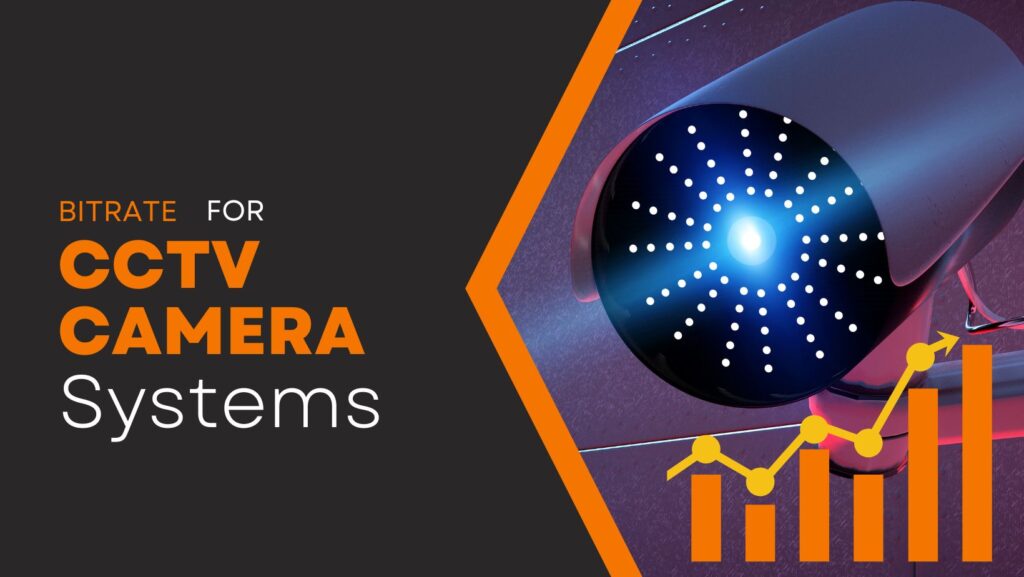The Guide To Bitrate For CCTV Camera Systems
If you’re like most people, you probably think that the higher the CCTV Camera systems bitrate, the better. But what you may not know is that there’s such a thing as a “sweet spot” for bitrate, and going too high or too low can have negative consequences for your security. So what’s the right bitrate for your needs? Keep reading to find out!
What is bitrate, and why is it essential for CCTV camera systems
The bitrate for CCTV systems is the amount of data that can be transferred in a given amount of time. This is typically measured in bits per second (bps). For example, a system with a bitrate of 100 Mbps can transfer 100 megabits of data per second. The higher the bitrate, the more data can be transferred in a given amount of time.
Importance Of Bitrate For CCTV Camera Systems
This is important for CCTV systems because it determines how much video footage can be captured and stored. The bitrate also affects the quality of the video footage. A higher bitrate results in a better quality video but also requires more storage space.
Some CCTV cameras have adjustable bitrates, which allows the user to trade off quality for storage space. In general, however, the higher the bitrate, the better the quality of the video footage.
Things Affecting The Bitrate
1. The type of camera being used:
The type of camera being used will have a big impact on the bitrate that is required. For example, a high-resolution 4K camera will require a much higher bitrate than a standard 1080p camera.
2. The frame rate:
The frame rate is the number of frames that are captured by the camera per second. A higher frame rate will require a higher bitrate to maintain image quality.
3. The amount of light:
The amount of light that is available will also affect the bitrate that is required. In low-light conditions, more data will be required to maintain image quality.
4. The level of compression:
The level of compression that is used will also affect the bitrate. A higher level of compression will result in a lower bitrate but may also cause degradation in image quality.
5. The size of the area being monitored:
The size of the area being monitored by the CCTV system will also affect the bitrate that is required. A larger area will require a higher bitrate to maintain image quality.
How to determine the right bitrate for your system
1. Consider the Resolution of Your Camera
The first thing you need to consider when choosing a bitrate for your CCTV system is the resolution of your camera. The higher the resolution of your camera, the more data will be captured, and the higher the bitrate will need to be in order to capture that data.
2. Consider the Frame Rate of Your Camera
Another factor to consider when choosing a bitrate for your CCTV system is the frame rate of your camera. The higher the frame rate, the more frames will be captured per second, and the higher the bitrate will need to be in order to capture that data.
3. Consider the Compression Ratio
Another factor to consider when choosing a bitrate for your CCTV system is the compression ratio. The compression ratio is the ratio of compressed data to uncompressed data. The higher the compression ratio, the lower the bitrate will need to be in order to capture that data.
4. Consider Your Bandwidth Limitations
Another factor to consider when choosing a bitrate for your CCTV system is your bandwidth limitations. If you have a limited amount of bandwidth available, you will need to choose a lower bitrate in order to avoid exceeding your bandwidth limit.
5. Choose a Bitrate That Meets Your Needs
Once you have considered all of these factors, you can then choose a bitrate that meets your needs. Keep in mind that you may need to experiment with different bitrates in order to find one that provides the best quality while still meeting your other needs.
The benefits of using a high-bitrate CCTV camera system
1. Increased Resolution
The most obvious benefit of using a high-bitrate CCTV camera system is that it results in an increased resolution. This means that you will be able to see more detail in the images that are captured by the cameras, which can be helpful in a number of different situations. For example, if you are trying to identify a suspect, higher-resolution images will make it easier to do so.
2. Improved Night Vision
Another benefit of using a high-bitrate CCTV camera system is that it can improve night vision. This is because high-bitrate cameras use more bits per pixel, which means that more light is captured by the camera. This can be helpful in low-light situations where traditional CCTV cameras would struggle to produce clear images.
3. Reduced Storage Requirements
Another advantage of using a high-bitrate CCTV camera system is that it can reduce storage requirements. This is because high-bitrate cameras produce smaller files than traditional CCTV cameras. This can be helpful if you are working with limited storage space or if you want to save money on storage costs.
4. Easier to Transfer Files
A high-bitrate CCTV camera system can also make it easier to transfer files. This is because the smaller file sizes produced by these cameras result in quicker transfer times. This can be helpful if you need to quickly send images or videos to another location.
5. Increased Flexibility
Finally, a high-bitrate CCTV camera system can offer increased flexibility. This is because these cameras can be used with a variety of different recorders for CCTV Cameras, including DVRs and NVRs. This means that you can choose the recording device that best suits your needs, which can be helpful in a number of different situations.
Tips for optimizing your bitrate and storage device for the best performance
1. Optimize Your Bitrate
The first step in optimizing your bitrate and storage device for the best performance is to optimize your bitrate. Your bitrate is the amount of data that your camera records per second. The higher your bitrate, the higher the quality of your video, but also the larger the file size. For most people, a bitrate of 30Mbps is more than sufficient.
2. Use a High-Quality Storage Device
The next step is to use a high-quality storage device. The type of storage device you use will have a big impact on the quality of your video. For example, if you use an SD card, the video will be lower quality than if you use a Hard Disk or SSD.
3. Format Your Storage Device
Once you’ve selected a high-quality storage device, you’ll need to format it. This will ensure that your video files are properly saved and won’t take up too much space on your device. To format your storage device, simply open the “Format” menu in your camera’s settings and select the desired file format.
4. Use an External Hard Drive
If you plan on recording a lot of videos, it’s a good idea to use an external hard drive. External hard drives are larger than internal ones and can store more data. They’re also faster, which means that you can access your video files more quickly.
5. Backup Your Videos
Finally, it’s important to back up your videos. You never know when something might happen to your camera or storage device, so it’s always better to be safe than sorry. There are a few different ways to back up your videos, such as using an online service or copying them to another storage device.
Conclusion
So, we hope you enjoyed our exploration of bitrate and its impact on CCTV camera systems. We know that it can be confusing but remember: the higher the bitrate, the better the image quality. And if you’re ever in doubt, just ask one of our experts – we’re always happy to help! Stay with us here at Credible BD CCTV blogs for more great articles about all things CCTV!


